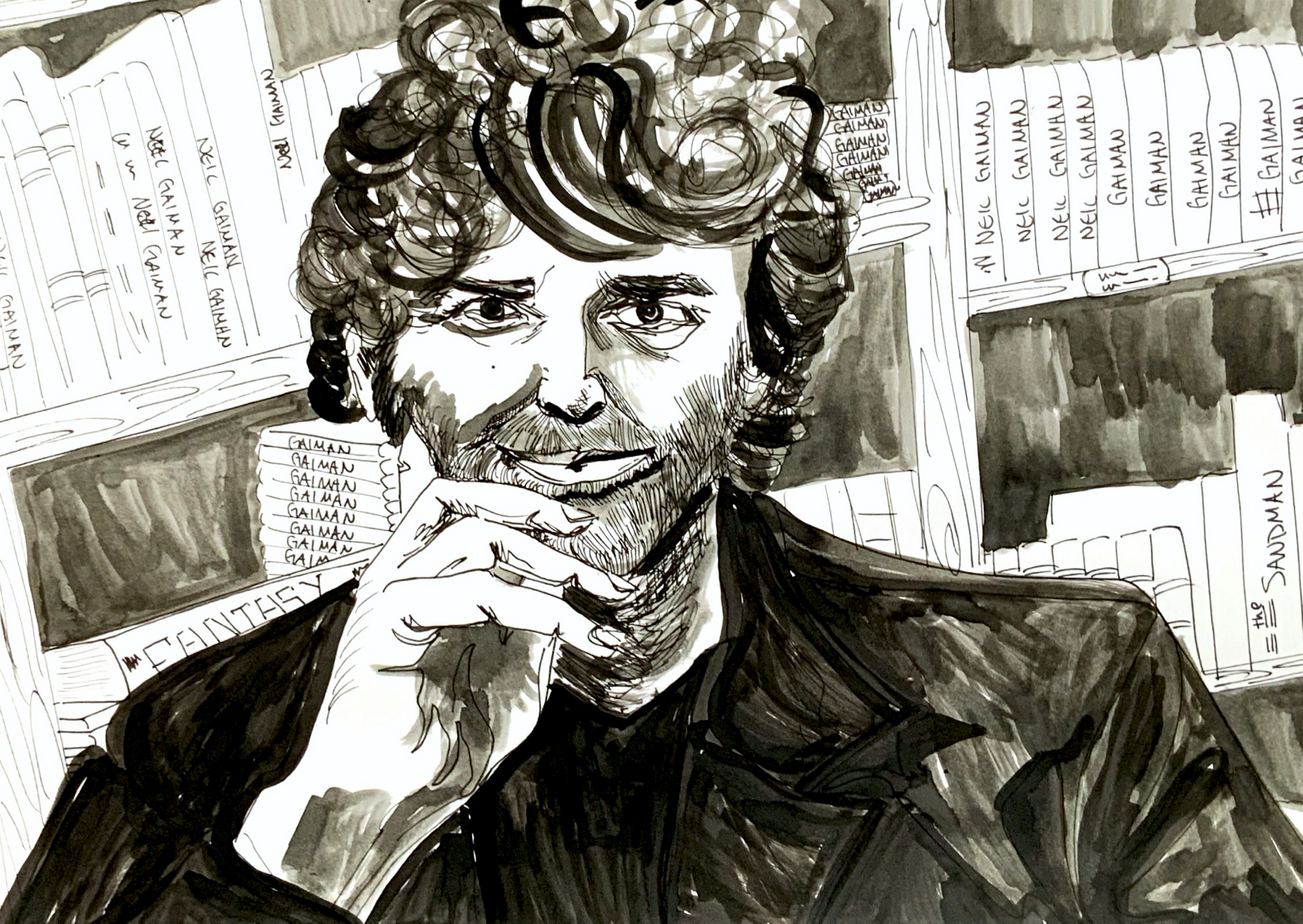What Neil Gaiman Taught Me about Storytelling
"Stories are part of us, and we convey truth through stories." - Neil Gaiman

For the last 37 years, Neil Gaiman has been writing stories that have captured readers' imaginations worldwide—perfecting the art of fantasy, horror, science fiction, and humor, Gaiman's widely considered one of the most prolific storytellers of our time. His most notable works include the award-winning 75-issue comic book series The Sandman, Neverwhere, Stardust, American Gods, Coraline, The Graveyard Book, and The Ocean at the End of the Lane. In 2021 he was inducted into the Will Eisner Award Hall of Fame for creative achievements in American comic books—just one of over 70 awards he's won for storytelling.
In Neil Gaiman's first-ever MasterClass, nature scenes strike the screen as Neil, dressed in a soft black suit, walks through a forest into a wooden shed filled with his novels. He sits in a chair, clasps his hands against his knee, and looks straight into the camera.
Here's what Neil Gaiman taught me about storytelling:
- Be honest
- Use everything as inspiration
- Find your voice through imitation
- Think about who's telling the story
- Care about what comes next
- Drive the story through conflict
- Write dialogue by listening to your characters
- Give your characters funny hats
- Build a vivid world
- Know the rules of your world
- Use humor as an ongoing thread
- The struggle is real
- Always write. Always finish things.
Be honest
To write fiction, you need to be honest and have something to say. You have to be willing to bear it all and walk down the street naked. It's okay to feel uncomfortable with how much detail you're exposing because the more specific you get, the more natural it feels.
Convince the reader that your father really was having an affair with an alien.
Use everything as inspiration
Pay attention to everything you hear, read and see. By being open to inspiration anywhere and everywhere, you'll collect resources to get you thinking. And when it comes to collecting inspiration, don't feel limited by the usual mediums. Instead, look at other fields—music can inspire books, and songwriters can inspire writers. Allow inspiration to come from unexpected places.
When looking for writing prompts and inspiration, read classic fairy tales and subvert them. For example, Snow White is really about a vampire princess and a necrophile prince. From this perspective, the queen is protecting the kingdom from her dangerous daughter. Now make your characters breathe.
Writing prompt: Flip fairytales on their head and write an alternative narrative.
Find your voice through imitation
It's a lot easier to write when you have a map, so read voices you love and try to imitate them. Once you've written at least 10,000 words (shared with no one), your voice will come through. Mistakes are bound to happen along the way—embrace them! They're your best teachers.
Get out the writing that nobody reads, and after 10,000 words, you'll find your voice.
Think about who's telling the story
When creating the narrative voice of the story, think about who's telling it. Does it feel like it's 1st, 2nd, or 3rd person? Is the author invisible or part of the story? Choosing a 1st person narrative is a powerful way to grab your reader and look them right in the eye. Whichever voice you choose, take a stab at it. If it's not working, reroute.
Tip: Don't tell your reader how to feel. Just do it, and they'll feel on their own. As Neil says, "I'm going to kill the unicorn and break your heart." (Flashback to 7-year-old me quivering in my bed while reading Harry Potter and the Sorcerer's Stone 👀.)
Care about what comes next
Every story starts with an idea. It can be small. Once you decide what your story is about (your theme), care about what comes next. People turn pages because they're asking, "And then what happened?" Keep asking that question as you start to notice connections. The process of writing a book is arduous, so have faith in yourself. Create a goal and keep climbing towards it without looking down (down = scary).
How to develop a short story into a book:
- Choose your theme (what's it about?)
- Build your characters (your actors - how they look, feel, behave)
- Create conflict (two characters who want different things)
- Develop your plot (every word and paragraph is a fork in the path)
- Decide on a conclusion (there are only 1-3 paths you can go down)
- Keep making choices, which lead you to inevitable places.
Brain Dump writing challenge: write down everything you know.
Drive the story through conflict
Start with a bang and build up conflict. Do this by making your characters want mutually exclusive things. Then decide how your characters deal with it—through strength (fighting) or intelligence (mind games), when one succeeds, the other fails. No matter what happens, keep going.
According to Robert Heinlein, an American sci-fi author who coined the term "speculative fiction," there are only three kinds of character-driven stories:
- Start poor become rich
- Boy meets girl
- A person learns a lesson
What characters want and need drive every story.
Write dialogue by listening to your characters
Once you know what your characters look like, listen to them. To help you write dialogue, pay attention to people. Write down what you hear at the bar, walking down the street, at a dinner party, or while ordering coffee. Since people don't speak grammatically correct, compress sentences to make your characters sound like themselves without the dangling modifiers. Just think, any relationship in your life could inspire your next story (watch Taylor Swift - All Too Well: The Short Film).
Give your characters "funny hats"
Funny hats can be symbolic or literal, but they're used to make your scenes easier to follow. You can do this by making your characters opposite one another in how they look, talk and behave. For example, have one character be tall, lean, and highly intellectual, while the other is short, stocky, and monosyllabic.
Build a vivid world
When worldbuilding, take from your real life, not fiction. As "God" place crucial elements somewhere unexpected like 'a school in the sky" or "on the backs of birds." Think of yourself as a smuggler and bring every detail of your real-world into your fiction. The more you care about the details of your world, the more believable it will be.
To start, ask yourself "weird questions" like:
- Where do your characters sleep?
- Where does food come from?
- What kinds of jobs do they have?
Think of your world as a character and paint a vivid picture. When describing a scene, assume your reader knows the basics, like what a tree looks like. So spend your time describing what makes your tree different. Appeal to all the senses—taste, smell, and touch. Use every sense to evoke the strongest emotion in your scene.
Read other worldbuilding stories to see how they work:
- C.S Lewis - Narnia
- Tolkien - The Lord of the Rings
- P.L Travers - Poppins
- Hope Mirrlees - Lud-in-the-Mist
- Ursula Le Guin - Tales from Earthsea
Know the rules of your world
A part of worldbuilding is understanding how your world works. You can do this organically by allowing your characters to make mistakes and revealing the rules through trial and error. You'll always know more than readers, and because of that, you can go against the grain and surprise them. But most importantly, understand the rules so you can break them.
Tip: Do just enough research, but don't spend your life researching. Visit locations that fit into your world and take notes or photographs that you can smuggle into your fiction.
Use humor as an ongoing thread
Humor isn't just about telling jokes or being goofy. It's about recognizing something honest or unexpected and using word choice and attitude to surprise your reader. On occasion, it's ending the sentence with a funny word. You can also make serious characters funny by giving them matter-of-fact personalities like Shelton on The Big Bang Theory.
The struggle is real
Yes, struggling is part of the writing process. You'll find yourself feeling frustrated at yourself and your material, and that's okay. Some days writing will feel like magic, and others, a migraine. But no matter how it feels when you look back at what you wrote, it all came from you.
Being brave doesn't mean you're not scared. It means you're scared, and you do it anyway.
Always write. Always finish things.
And yet, the most important lesson I learned from Neil Gaiman was in the last 5 minutes of his MasterClass. Simple and perhaps obvious not just for writing, but for life.
- Experience the world, so you have things to say.
- Start writing regularly.
- Finish what you started.
- Everything that happens in the living happens in fiction.
You learn more from finishing a failure than writing a success.
Cheers to you and your future fiction.
